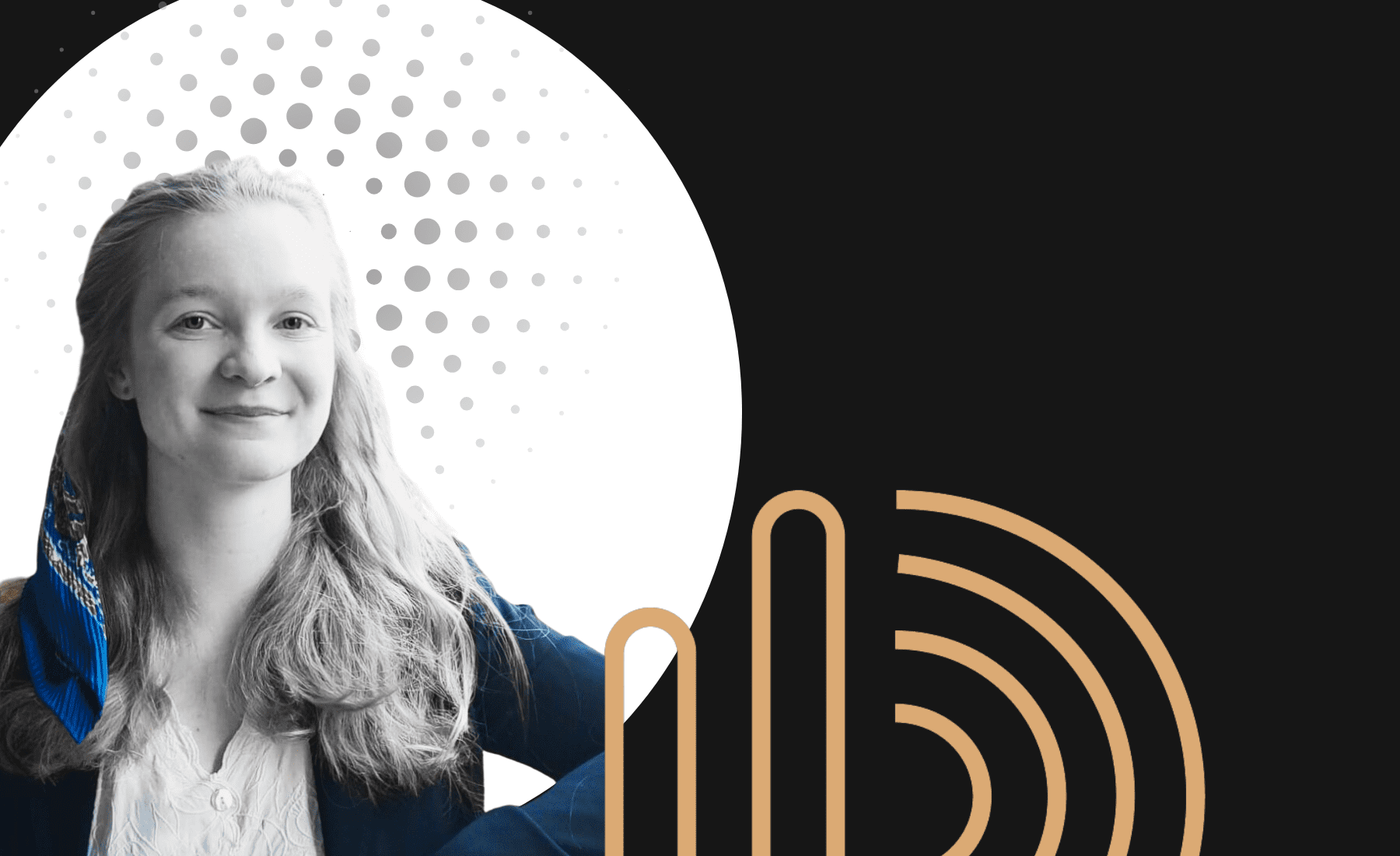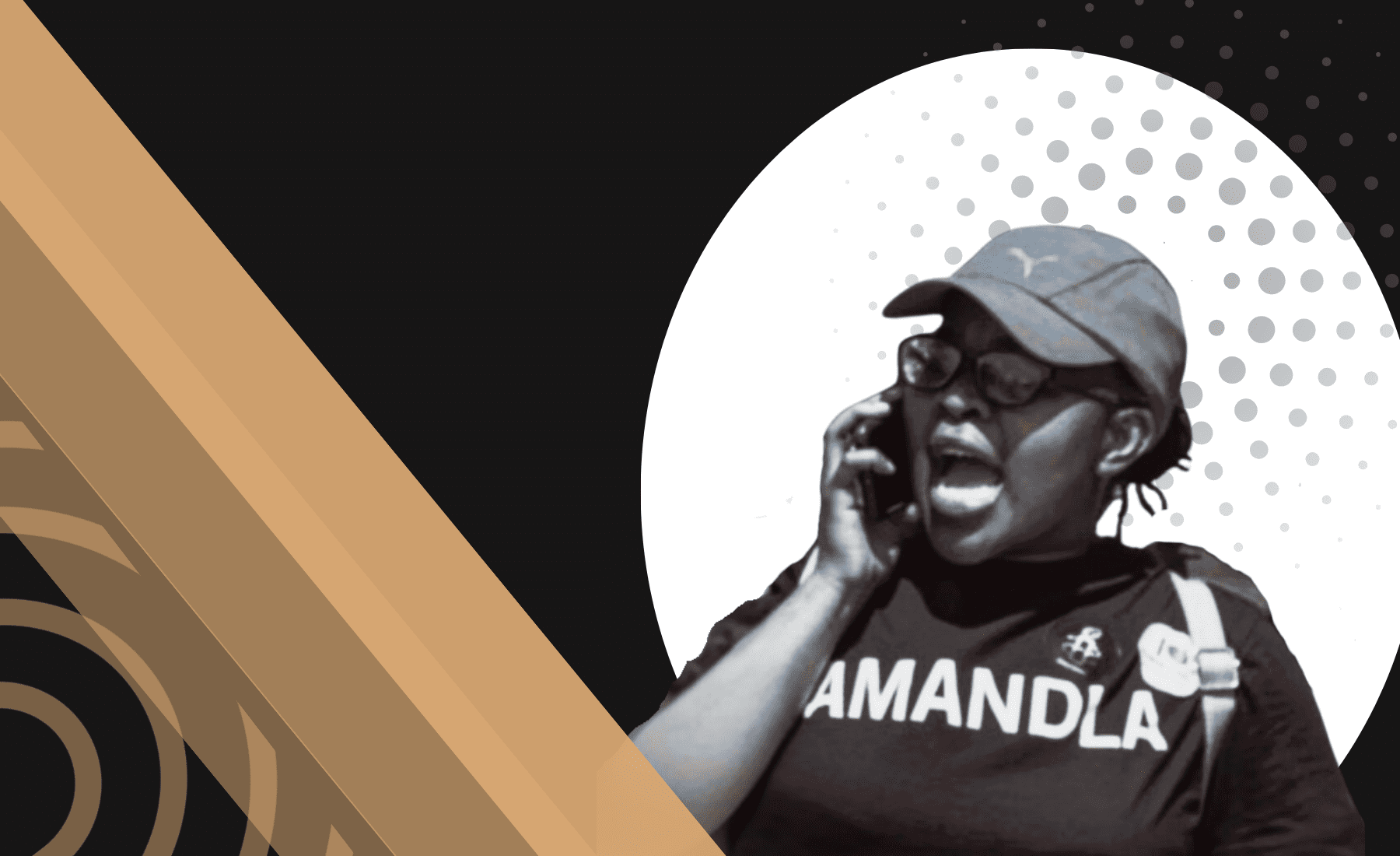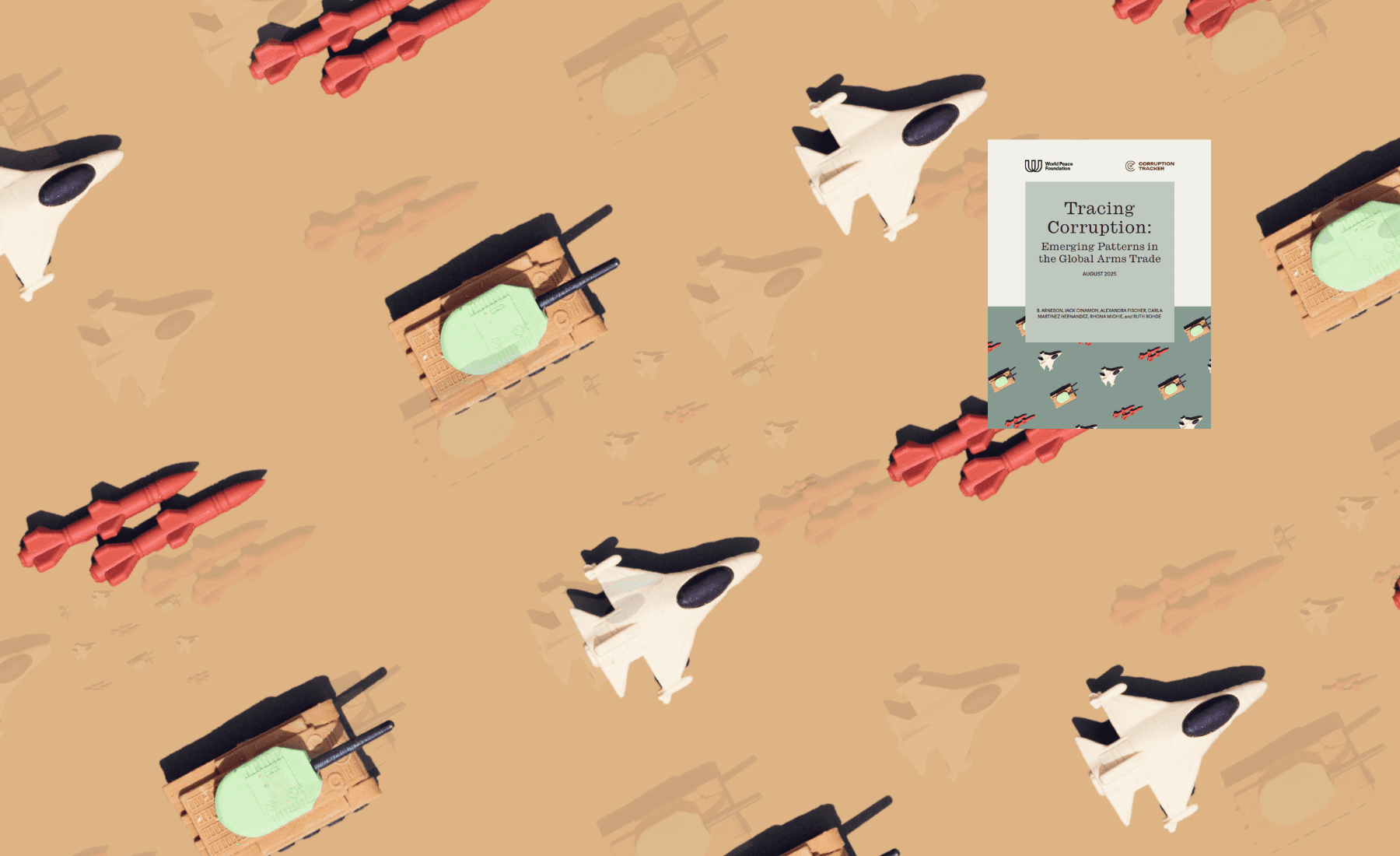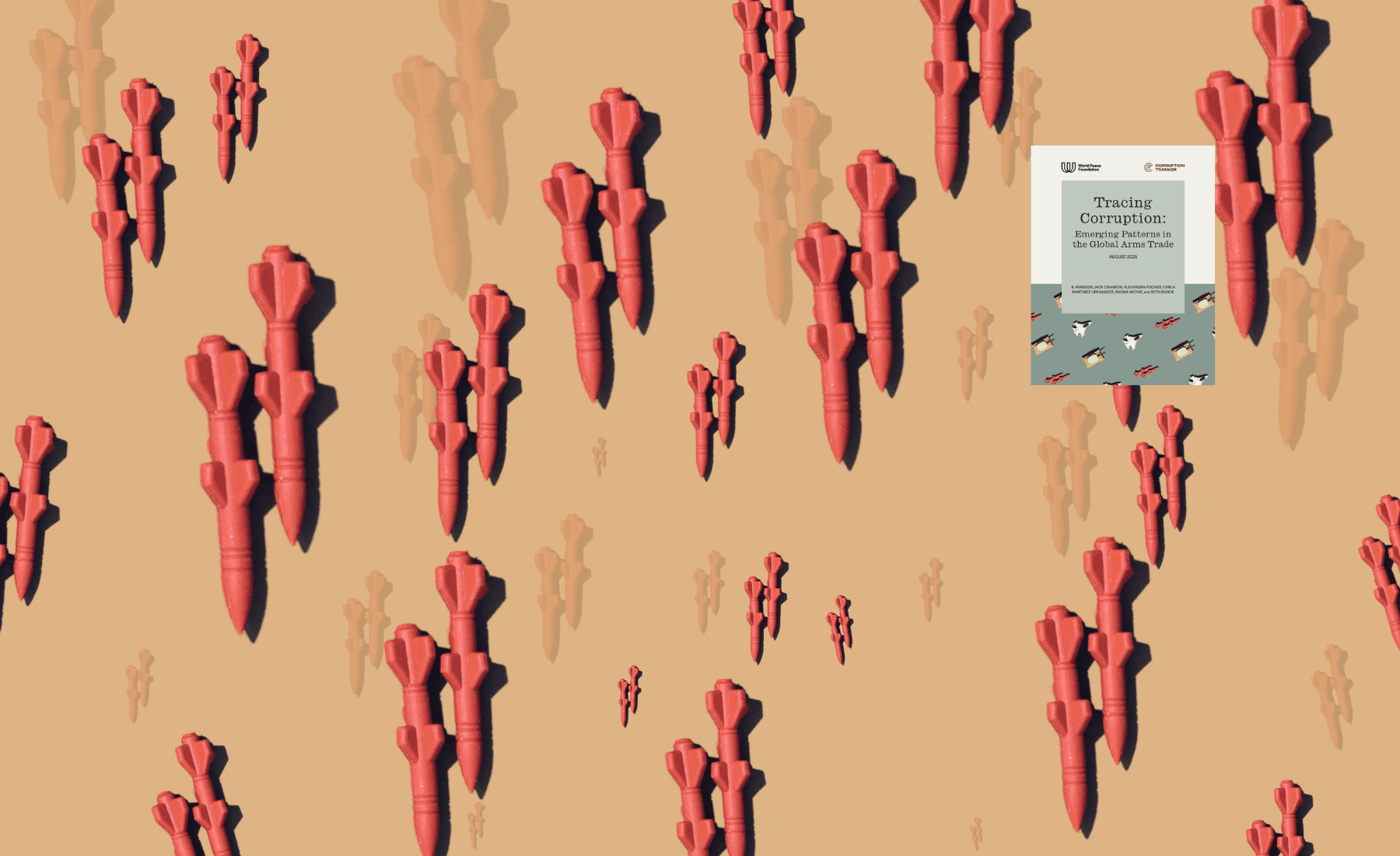Bridget Conley: The Corruption Tracker, or CT, is a woman and youth led project that seeks to delegitimize and dismantle the arms trade using the lens of corruption. It aims to collate document and expose information on corruption in the arms trade. By doing so, the CT hopes to be an invaluable and accessible resource for campaigners, journalists, human rights organizations and researchers working to dismantle the global arms trade. Ruth, what is your role at the corruption tracker or CT?
Ruth Rohde: I am a co-founder of the Corruption Tracker, and I am also the program manager, which means I’m supposed to have an overview of what we’re doing, why we’re doing it, and when we’re doing it. In reality, it means a lot of picking up whatever needs to be done. We don’t really have a very strong hierarchy in the project. In reality, every decision that we make is very much a team-based decision.
Bridget: If you think back to the time when you co-founded the corruption tracker, what issues most concerned you, and why did you think the CT would be a strong way to respond to those issues?
Ruth: That’s an interesting question. We founded the CT in 2020, which was during the pandemic, and before the Russian invasion of Ukraine. And I’m saying those two things, because they impact how our work has developed. I personally got involved in anti-militarist work when I was in university. I was still in my undergrad studies when we founded the Corruption Tracker, and the key thing that concerned me at the time was, how can I, as a white person in the West make a difference in addressing essentially global injustices in a way that doesn’t perpetuate white savior syndrome.
My approach to that question in my undergrad, came from a very specific context in which I joined a campaign that was exposing a local small arms company for an illegal arms export to Mexico. Those weapons were then used in a massacre of students in Mexico. I’m from Germany, and at the time, I was like, that doesn’t seem right, that these students halfway across the world are being killed by the weapons that are being made a few towns over from me. For me, that campaign, which I joined toward the end — it was, like a 10-year campaign — really, brought home to me the point that the arms trade is something that we’re doing in the West that’s contributing to and creating a lot of harm around the world. It’s something that I can address at home, from the “belly of the beast” if you will.
Bridget: What was the student massacre in Mexico?
Ruth: In September 2014, 43 student activists from the Ayotzinapa Rural Teacher’s College were forcefully disappeared, and six people were killed. There is still no trace of most of the disappeared. Mexican investigators found that rifles from the illegal German shipment were used. My concern quickly became that there is a system in place that is causing harm, and Western countries are by far the largest arms exporters in the world. The US is the biggest, but other Western countries, like Germany, the UK and France are also very high on the list.
When the Corruption Tracker started, the whole issue of corruption was very new to me, but it was something that we wanted to explore as an element that sometimes went under the radar, be it in the way that it was written about, discussed and seen. Corruption is something that people often associate with the Global South. We had a perspective that differed from that, where we can show a pattern of how the corruption is exported to a large extent with the weapons by Western countries.
We have a very interesting structure at the CT where, from the beginning we had quite a young team. I was 22 when the Corruption Tracker started, and our co-founders, were all in our early to mid-20s. But some of the work collecting cases was already being done, by Sam Perlo-Freeman – who is now with Campaign Against the Arms Trade in the UK – and who had been a researcher with World Peace Foundation. We had Andrew Feinstein in the UK, who I actually met through the campaign against our local arms maker in Germany. He used to be an MP in South Africa, on the Public Accounts Committee, and exposed a major corrupt arms deal in South Africa. He had to leave the country, which is how he started working on corruption in the arms trade. Only after coming to the UK, and after having to leave his local context, did he realize that this is something that hadn’t just affected the young democracy in South Africa. They got taken for a ride by these Western arms companies. But this was a pattern that stretched across the globe, and it’s something that we’ve heard from people in Argentina, in different European countries, and so on.
This is one of the major things that we wanted to show at the Corruption Tracker.
Additionally, we wanted to provide a space for an anti-militarist analysis of corruption in the arms trade, which was also something that we felt was sometimes missing in the anti-corruption spaces. They were talking about corruption, but not really seeing it from an anti-militarism lens, and on the other side, the anti-militarists weren’t talking about corruption as much. So we wanted to really bring those spaces together a bit more.
Bridget: Has anything changed in your understanding of the core issues or in what motivates you over time?
Ruth: I think the Russian invasion of Ukraine was an inflection point in the sense that it led to this massive re-armament spiral in Europe. It’s forcing us, essentially, to look at our domestic procurement structures a lot more than we were originally doing. We were looking so much at arms and corruption flowing out of Europe, and this is also where a lot of information is available. But now, we’re seeing this massive armament spiral. I think in the US, people were aware of it domestically for much longer, just because of the massive budgets, the massive waste in that system, and the massive conflicts of interests, the way it’s taking over your political system.
I personally have developed my understanding of what is an anti-militarist lens on corruption in the arms trade quite substantively over time. We started out on a relatively naive basis of, this is a problem of weapons and money flowing in a certain way and in a certain direction, and both together are a huge problem, and the corruption is very intimately tied to the arms. Now, we use corruption in a relatively wide sense. We don’t just use it as bribe exchange and things like that. We can think of corruption also as the takeover of entire political systems and entire political projects for the benefits of very few. It’s merged into a much more substantiated anti-capitalist lens. We’re seeking to really understand how these military structures are capturing the states that we live in.
From my perspective, I feel like it’s almost something that we had to experience for ourselves in Europe to really understand what that meant. I remember when Russia first invaded Ukraine, I can see the argument why, as the West, we should be helping Ukraine defend itself against what was clearly an illegal invasion. But what is happening now is very different to that. We are seeing how militarism tends to take over once you let it even give it even a little bit space to grow. That’s really scary in what we’re seeing in society now. We are seeing the complete deregulation of the military industry. You’re really seeing the creep of the military industrial complex into every corner of society.
Bridget: I think for me, Ukraine remains a very difficult case. Because I agree with you, obviously, the Ukrainians have the right to respond to an invasion, but at the same time, like you said, we saw the response be like, let’s not just open a hose to help support them. It was open the floodgates and ride that wave of militarism. I remember when NATO countries were being pushed, I think the first Trump administration to spend 2% of GDP on their military, and now the target is up to 5%, right?
Ruth: It just shows how completely divorced it becomes from any actual analysis of any geopolitical threats. It becomes self-replicating and it causes a lot of harm domestically. In Europe, we’ve had austerity since the 2008 financial crisis, which means virtually no public spending on things that are security concerns — like the climate crisis. We had a massive increase in poverty, the state is losing assets, average people are bleeding assets. Basically, the only thing that is now being invested in — that we’re breaking austerity for — is the military industrial complex. Especially for young people, if that’s the only stimulus in the economy, they have no choice but to work in these systems. Apart from the domestic downsides, the international ramifications are — Ukraine is building up a massive arms industry. In the name of this new militarism, European countries are deciding to completely ignore their arms export control restrictions, not that they were ever fully functional, but like now there’s this sense of urgency. We’re basically being told, that the only way we can make ourselves safe is if we make other people actively unsafe. The German defense minister said at some point, that we are going to have to start selling to non-perfect democracies. What he meant by that was, for example, selling to India, where apart from being incredibly repressive domestically, India could go to war with Pakistan any day.
Is this really what we want to be doing? Is this not something that is going to come back and bite us if we arm basically anyone and everyone, because our arms companies want to grow and want to grow further and further? And you might think that, we’re spending so much more domestically, we should have to export less. But these are private, capitalist growth-oriented companies, and they’re seeing a massive opportunity in the global increase in military spending, in arms procurement, in the sense of insecurity, of military insecurity. That doesn’t mean that I don’t blame Russia for their own actions, which is the invasion of Ukraine. But I do think that the European countries are refusing to make choices where we can make choices, which is to not completely restructure our entire economies towards military production. It leads to the necessity to use those military products that you keep producing. Hopefully, at some point, the war in Ukraine is going to be over, or, I think more realistically, frozen. And then what happens with all this overproduction? Are the arms companies suddenly going to be ok with shrinking? No, they’re already setting themselves up to export to everyone and anyone that they can find.
Bridget: Exactly. And once you amp that machine up, it takes incredible amount of effort to pull it back. And I’m not sure if we’ve ever seen that done. Maybe at the end of the Cold War, there was an attempt to pull back little bit, until it rose again.
What do you want the impact of your work to be? Where do you see opportunity for the work that you’re doing, not just with the Corruption Tracker, but also with the Shadow World. Where do you see possibilities to make an impact, to make a change in this momentum, or at least to document it?
Ruth: I’m also a researcher and Project Coordinator at Shadow World Investigations, which is a UK-based organization that investigates corruption and militarism and also supports movements and using that information to make a change. I think of myself as much more of a researcher than an organizer. These those are very different skills. We need to keep building a positive, anti-imperial, anti-colonial, consistently principled, international anti-militarist movement. The work that I can personally do, given that I’m a researcher is making sure that those movements have the kind of information that they need to do that work effectively.
We have had a major focus in recent years on the war in Yemen, and, obviously, the on-going genocide in Palestine. Our role as researchers, and we sometimes describe ourselves as investigative journalism-adjacent, is not only to provide analysis, but also to provide information. The kind of journalism that we do is often looking at data and information that’s out there, but that’s nobody has looked at. For example, I wrote a report relatively recently on German arms exports to Israel that was based on data provided by the Israeli government. It’s data that’s there, but nobody had used it. Hopefully, now it is being used by lawyers and other journalists to contextualize their stories, and by activists who need to have concrete ideas of what’s happening. I’m hoping that the information that we can provide helps people understand their own situations better, and specifically helps organizers and activists in building the movements.
The same is true for the Corruption Tracker. We are gathering and synthesizing information that is already out there, but is often too scattered to easily understand. We make that information more accessible.
We regularly give presentations, talks, workshops and trainings to everyone from student university researchers trying to understand how their university is complicit in the arms trade to larger civil society organizations. We did one at the European Parliament. We speak to activist meetings, we speak to campaigns, like BDS and others. We are trying to provide the information that we’re finding as researchers to activists.
Bridget: The CT, as I noted, is a youth and women-led organization. How do you think these two traits influence the way the CT works?
Ruth: We sometimes discuss whether we should still call ourselves youth-led. I think in this field of anti-militarist work, we are part of a new generation of people doing this work, and we are hoping that this generation is going to in some ways look different from the generation that has been doing this work for a longer period of time. We owe a lot to them, but especially in arms trade research, it was quite a heavily male, especially white men, dominated field in Europe and in the US. Hard security topics are seen as a very masculine domain. I do also think there is quite a lot of older male privilege in talking about these things, because older white men are just taken more seriously.
Given our work is youth-led and being women-led, I hope that we can help people see themselves in this space that might not otherwise see themselves in the space. We also have a lot of work left to do to increase our diversity and I want us to go beyond this. If anything has shown us in the recent years is that people who are directly affected by things, are the most effective advocates of their own issues. We see this especially in activism around Palestine — the sheer number of Palestinians who are involved in this and who have done a lot of training each other on how to advocate for themselves. We need to get to a point where you are taken as an expert on your own issues. This is somehow not a given – much of the media seem to think that you can only be an expert on some region of the world if you are a straight white man from the West, and that is just not the case. We are hoping at least to make a little bit of a start in that by being a women-led project.
And, there’s a long and really proud history of feminist, anti-patriarchal militarism. The way that militarism influences our society is in very patriarchal ways. People are affected in gendered ways by militarization. The way in which people presenting as women or identifying as women are specifically impacted by militarism, is through this dominance of patriarchy that comes with these very militarized systems. Men are also impacted by this — a lot of men don’t want to be a part of this, but have these like values pushed on them. You have to be the defender of your country and your nation and your people and your girlfriend.
In Germany, we used to have military service for men. One of the questions that they asked conscientious objectors, or potential conscientious objectors was, if you’re in the forest with your girlfriend and you encounter a Russian soldier, would you not defend your girlfriend? This was the kind of question that they would try to trip people up to say, of course, I would defend my girlfriend. Then they’re like, Okay, so why wouldn’t you defend your country? These are the kinds of ways in which patriarchal structures are very intertwined with militarism. It affects everyone in society, but in gendered ways.
We are putting ourselves also in the tradition of feminist antiwar movements, while at the same time trying to our best not to fall into white savior feminism. Instead, we’re adopting more anticolonial and anti-imperialist ways of working, which I think was also in many ways built into the CT and into my work more generally, through this idea of opposing the parts of our societies that are most actively causing harm. We are becoming part of the resistance against that and supporting people who are doing that work where they’re most impacted. It’s a struggle, it’s not a straightforward process. We are all in a learning process and it’s not something that just happens. We are all parts of our societies, and there’s always going to be ways in which we mess up these developments, but I do think that they’re extremely necessary, because otherwise we completely mess up — and we miss out on some of the most important voices in this debate, which is the people who are most affected.
Bridget: Is there anything you’d like to add that you would like the different audience to know about the CT?
Ruth: Whenwe founded the CT, nobody thought that this would be a project that would still be running five years later. Or that we would still be growing, and that it would still be so necessary and relevant. If we don’t fix our very broken systems — and I think two of the main things that need fixing is wealth inequality and capitalism and tied to militarism — if we don’t fix those things, we don’t have a future. Militarism is both a huge contributor to and a distraction from the climate crisis. We either survive together or we go down together. And that sounds cheesy, but it’s actually true and I think that I have the huge privilege of doing this for a job. I really admire people who do it on a volunteer basis. Week after week, day after day, year after year, and any activist that comes to a meeting, and so I just want to say to people to show up for anything in any capacity that you can and that you’re not alone. We all started as volunteers at the Corruption Tracker. Many of us transitioned out of being students into jobs that are still relevant and close to the field. So in that sense, we were very lucky.
We see struggles as connected and we sometimes are very critical of ourselves in the sense that we’re like we’re not always able to show up in the spaces where we’d want to show up more for other for causes that other people are fighting on. But we’re doing our best, and I hope that others can do their best, because we are not alone.
Bridget: Ruth, thank you so much.
Learn more about our program on Tracking Corruption in the Arms Trade.



